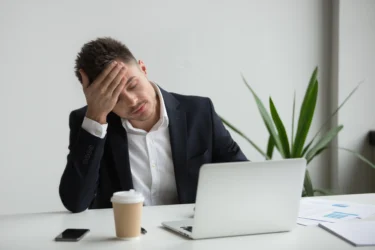12 Places the Body Stores Stress and How it Affects You
By Dr. Vishesh Bharucha +2 more

Get,

to manage your symptom
Get your,


4 Cr+ families
benefitted

OTP sent to 9988776655



You’ve successfully subscribed to receive
doctor-approved tips on
Whatsapp

Get ready to feel your best.

Hi There,
Download the PharmEasy App now!!


Register to Avail the Offer
Send OTPBy continuing, you agree with our Privacy Policy and Terms and Conditions

Hi There,
Sign up on PharmEasy now!!
Trusted by 4 crore+ families

OTP sent to 9988776655



You have unlocked 25% off on medicines




Code: NU25
By Dr. Vishesh Bharucha +2 more
Table of Contents
How often do we suppress our emotions in an attempt to appear composed or “normal”? For many of us, the answer is, quite frequently. It is common to bury feelings such as frustration, anger, sadness, or fear because they can make us feel vulnerable or overwhelmed.

In an effort to maintain control, we may ignore or suppress these emotions to manage immediate challenges. However, this coping mechanism can be detrimental to our health. When emotional stress is not properly addressed, it may manifest physically in the form of unexplained aches and pains, a phenomenon known as somatization1.
Somatization refers to the expression of psychological distress through physical symptoms, often in the absence of an identifiable medical cause. It is important to note, however, that not every stress-related symptom qualifies as somatization disorder.
Experts emphasise the importance of recognising and accepting our emotions, rather than dismissing them. Suppressed feelings can trigger psychosomatic responses in the body, leading to persistent discomfort or mysterious physical ailments.
Stress has a significant impact on our mood, general well-being, behaviour, and overall health. Early medical intervention when symptoms such as anxiety, depression, or mood changes appear can be beneficial in managing the condition effectively.
A holistic approach is often recommended, involving mental health support, lifestyle adjustments, and, where appropriate, medication.

The lower back is often identified as a common site where the body holds tension resulting from prolonged emotional stress. Many individuals experience persistent discomfort or even debilitating pain in the lumbar region. While psychological stress can contribute to muscle tension and amplify pain perception, it is important to clarify that lower back pain is typically influenced by multiple factors, including posture, physical strain, and underlying medical conditions2.
Chronic stress activates the body’s sympathetic nervous system, which may lead to increased muscle tightness and sensitivity to pain. However, it does not exert direct mechanical pressure on the spinal cord, as sometimes believed. Similarly, while the idea that “unexpressed anger” alone causes back pain is a popular notion, it is not supported by scientific evidence and should not replace medical assessment2.

Fear can have a strong impact on the digestive system. In extreme cases, it may even trigger involuntary urination or bowel movements due to a surge in autonomic nervous system activity.
While emotions are not physically stored in the stomach or intestines, fear and chronic stress can disrupt digestion, leading to symptoms like bloating, pain, constipation, and contributing to conditions such as Irritable Bowel Syndrome (IBS).
Peppermint oil capsules have shown evidence in relieving IBS symptoms, though peppermint tea may have limited benefit3.
Acknowledging fear and discussing it with someone you trust can help reduce its emotional and physical effects. Open expression often leads to better emotional control and improved well-being.

Emotional distress, especially from hurt or loss, can manifest as chest discomfort. People who suppress such feelings may report tightness, shallow breathing, or even experience panic attacks. In many cases, medical evaluations reveal no clear physical cause.
While emotions are not physically stored in the chest or heart, anxiety and stress can trigger real physical sensations. It is essential to rule out heart and gastrointestinal conditions when chest pain occurs.
Deep breathing exercises bring relief to chest tightness and reduce anxiety4. Allowing yourself to process sadness or emotional pain can promote emotional relief and a sense of lightness.
Chronic stress can affect mood, immunity, digestion, and heart health. While it contributes to the risk of Type 2 diabetes, it is not the main cause. Factors such as genetics, obesity, and lifestyle play a more significant role.

Feelings of losing control can trigger tension headaches or, in some cases, migraines. Individuals with a strong need for control may be more prone to recurring headaches when faced with uncertainty or stress5.
While emotional stress can contribute to headache frequency and intensity, it is one of several factors. Chronic headaches or migraines should be properly assessed by a healthcare professional to determine underlying causes and suitable treatment.

Our breathing often reflects our emotional state. Calmness is typically accompanied by slow, deep breaths, while stress may cause rapid or shallow breathing. Prolonged stress can lead to sensations of breathlessness or even panic attacks, though these are usually not signs of a physical breathing disorder.
Practising deep breathing techniques, such as diaphragmatic breathing, can help calm the nervous system and reduce anxiety. Regular practice can train the mind and body to respond more calmly to stress4.

Feeling overburdened or overwhelmed often leads to tightness in the shoulders and neck. This is a common psychosomatic response, where mental stress contributes to physical symptoms, even in the absence of an underlying medical condition.
To ease this tension, consider sharing responsibilities or seeking support. Reducing the pressure on yourself can help relieve both mental and physical strain6.

Living in an oppressive or emotionally restrictive environment may contribute to voice strain, throat tightness, or difficulty expressing oneself. Some individuals may experience voice loss or a sensation of tightness during periods of high stress.
While stress can worsen existing speech difficulties, such as stammering, it is rarely the sole cause, especially in adults. Adult-onset stammering is uncommon and usually linked to neurological conditions or severe psychological trauma7.
Creative expression, such as reading aloud or journalling, can help release emotional tension and support communication.

Stress, especially during periods of major life change or personal growth, often disrupts sleep. Many people experience insomnia when facing emotional or psychological strain.
Chronic insomnia is linked to an increased risk of health issues such as hypertension, diabetes, depression, and cardiovascular disease. While it does not directly cause these conditions, it can contribute to their development over time8.
Addressing stress and adopting healthy sleep habits are essential for overall well-being.

Many people respond to stress by clenching their jaws or grinding their teeth, a condition known as bruxism. This habit can strain the jaw and neck muscles, often causing pain and stiffness. It may also contribute to temporomandibular joint (TMJ) discomfort and visible frown lines on the forehead9.
Since many people are unaware they do this, particularly during sleep, recognising the signs early can help prevent long-term discomfort. Stress management and, in some cases, dental intervention may provide relief.

Chronic stress can affect the pelvic floor by increasing muscle tension in the region, which may lead to discomfort, stiffness in the hips, or a weakened connection with the core muscles. This tension can contribute to pelvic floor dysfunction over time.
Although there is limited evidence linking stress directly to changes in connective tissue, prolonged muscular tension can affect how these tissues function10.
Pelvic relaxation techniques, gentle stretching, and stress management strategies may help relieve tension and support pelvic health.

The hips play a key role in maintaining posture and physical mobility. While stress itself does not directly cause loss of muscle tone or shape, prolonged inactivity, injury, or poor posture may lead to weakened muscles and discomfort.
Emotional distress is often said to “reside” in the hips, but there is no scientific evidence to support this. Nevertheless, practising hip-opening yoga poses and pelvic floor exercises can enhance flexibility, strengthen muscles, and improve overall posture—helping to alleviate back pain and support physical well-being11.
Also Read: How to Reduce Cortisol Levels for Better Health

Stress often causes us to hunch forward unknowingly, leading to poor posture that restricts the diaphragm’s movement. This can result in shallow, inefficient breathing and a sensation of breathlessness or fatigue12.
Reduced expansion of the chest due to slouching limits lung capacity, making it harder to take full, deep breaths. Over time, this can decrease diaphragmatic function and overall oxygen intake.
Improving posture and practising deep breathing exercises can help restore proper breathing patterns and reduce feelings of exhaustion.
Also Read: What Is The Link Between Diet And Mental Illness?
Repressing emotions can lead to a range of physical symptoms, as the body often reflects the stress the mind carries. Addressing these feelings, particularly through open conversations with someone you trust, is a key element of psychotherapy and emotional self-care.
By managing stress and prioritising mental well-being, we not only improve our own health but also enhance our ability to support others in meaningful ways. Understanding and practising stress management is essential for a healthier, more balanced life.
Also Read: 5 Ways In Which Sedentary Lifestyle Affects The Body!
Disclaimer: The information provided here is for educational/awareness purposes only and is not intended to be a substitute for medical treatment by a healthcare professional and should not be relied upon to diagnose or treat any medical condition. The reader should consult a registered medical practitioner to determine the appropriateness of the information and before consuming any medication. PharmEasy does not provide any guarantee or warranty (express or implied) regarding the accuracy, adequacy, completeness, legality, reliability or usefulness of the information; and disclaims any liability arising thereof.
Comments

Leave your comment...
You may also like
Comments